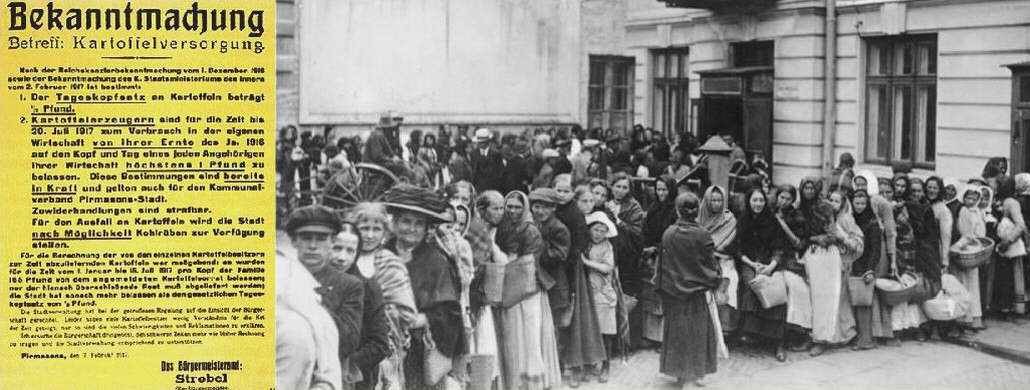
[Germany, winter 1916/17] The British naval blockade caused great suffering in Germany. This winter, the need was dramatic. A rainy autumn had caused a potato slight and only half of the harvest could be saved,
Moreover, there was far too little coal. Thus, the households had no coal to heat, and the railroad no coal to operate the locomotives. This made it difficult to transport the few potatoes from the farmers to the consumers. Moreover, parts of the already small harvest got rotten during transportation.
As a substitute, turnips were distributed. Although many people ate them in the morning, at noon and in the evening, they did not get enough calories and thus strength for the heavy work that had to be done every day. Moreover, this winter was freezing cold, for weeks the temperatures were far below zero. Public soup kitchens were the last resort from starvation, even if the food was not good.
In the “Stübchen”, Jacob looked at his empty shelves. He did not know where to get food. Meanwhile, everything had been shifted to accommodate the needs of the wartime economy. However, the authorities failed to distribute the existing groceries across the country. A helpless rage grabbed him when he thought of the thriving black market. There were people who profited from other people’s plight, and this was seen by many people as great injustice and state failure. Jacob was desperate. The sight of so many men, just skin and bones, children, adults and old men, broke his heart. They would be easy victims to flu, tuberculosis, and other diseases due to the weakened immune system. Many would not survive these hunger years.
Jacob’s prayers
Sometimes only his affection for the people around him kept him on his feet. He, too, had fought in wars, the terrible fratricidal war between Prussia and Austria, and then the Franco-German war. But this war dwarfed everything one had known so far. The most modern war machinery could kill countless people within a few minutes, and make entire regions hostile to life for years to come. Air and submarine warfare, poison gas … how many fathers, brothers, and husbands at the front would not return home?
And then he only wished that the war would finally end, and that he was granted another few years of peace. Often his thoughts wandered to the young Count Joscha Csabany in Hungary and his father Andras in Vienna, hopefully they were well. He wanted to watch Kathi and Walter enjoy their lives as young adults, become winemakers, and maybe he would even be there when they started their own families. He wished for Helene to work with beautiful fabrics.
And his “Stübchen”, his shop should go on. He wanted to be there when the shelves would be well filled and his guests enjoyed their meals. Susan would take over from him. She had been so happy as hostess on her “Aimée” until the death of her beloved husband had thrown her off track. Jacob was so grateful that she helped him, and helping others helped to ease Susan’s pain a bit.
Will America enter the war?
The Bergmann vineyard was also a refuge for many people. They could not heat all the rooms, but the makeshift nursery was warm, and there were field beds for the night.
One evening Susan and her mother Lena sat together. Although they were very exhausted, they could not sleep. “You are afraid that there will be a war with the United States to, aren’t you?” Susan asked. Lena nodded. Twice she had been with her husband Emil in the USA, first to help rebuild the Mountain Men vineyards in the Shenandoah Valley after the Secession War, then again with Susan for the wedding of Lorenz Bergmann’s daughter Amber. She had learned to love the country.
“Have you heard from Amber?” she asked. Susan shook her head, tears rose into her eyes. “No, unfortunately not,” she replied. “The last letter came many months ago, saying that the tide of public opinion is turning against Germany. President Wilson wants to keep the USA out of the war, but there are sabotage acts, behind which the German military attachés The Americans have lost their lives, and if Americans are killed by the U-boat war, the US will intervene, and Amber is doubly bad, Her father was German, her mother American, and her son-in-law John is an instructor in Westpoint. So the war would directly affect her family.”
References
The photo is from the German Wikipedia. Das folgende Bild stammt aus der freien Enzyklopädie Wikipedia und steht unter der Creative Commons Lizenz 3.0. Es wurde im Rahmen einer Kooperation zwischen dem Bundesarchiv und Wikimedia Deutschland aus dem Bundesarchiv für Wikimedia Commons zur Verfügung gestellt: Anstehen nach Brot in Deutschland, 1914. Bundesarchiv, Bild 183-R00012 / CC-BY-SA 3.0

Be the first to comment